人教版英语八年级上册全册教材全解:人教版英语八年级上册-Unit-1-Where-did-you-go-on-vacation教材全解
范文人教新版英语八年级上册全册教材全解Unit.docx
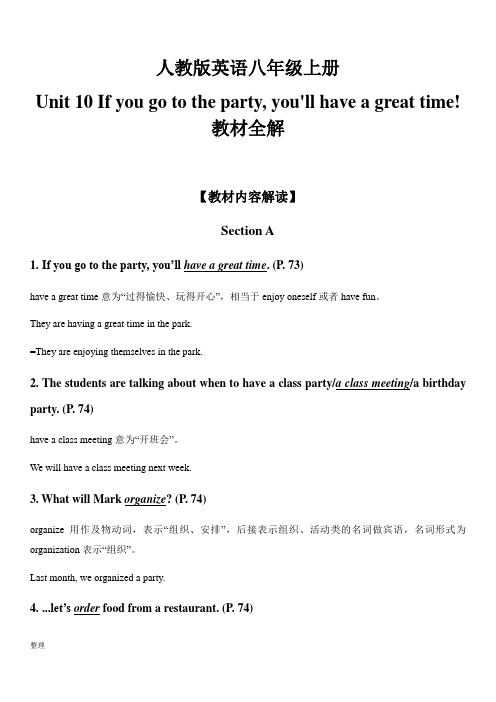
人教版英语八年级上册Unit 10 If you go to the party, you'll have a great time!教材全解【教材内容解读】Section A1.If you go to the party, you’ll have a great time. (P. 73)have a great time意为“过得愉快、玩得开心”,相当于enjoy oneself或者have fun。
They are having a great time in the park.=They are enjoying themselves in the park.2. The students are talking about when to have a class party/a class meeting/a birthday party. (P. 74)have a class meeting意为“开班会”。
We will have a class meeting next week.3. What will Mark organize? (P. 74)organize用作及物动词,表示“组织、安排”,后接表示组织、活动类的名词做宾语,名词形式为organization表示“组织”。
Last month, we organized a party.4....let’s order food from a restaurant. (P. 74)order此处表示“订购、点菜”,order sth. from...表示“从……订购某物”。
I ordered some chicken from that shop.【拓展】order还可以作及物动词,意为“命令”,表示“命令”时,常用于order sb. (not) to do sth.结构中The police ordered him to wait right here.5.If we ask people to bring food, they’ll just bring potato chips and chocolate because they’ll be too lazy to cook. (P. 74)ask sb. to do sth.意为“要求某人做某事”,否定形式为ask sb. not to do sth.“要求某人不要做某事”。
人教版新目标八年级英语上册单元知识详解全册
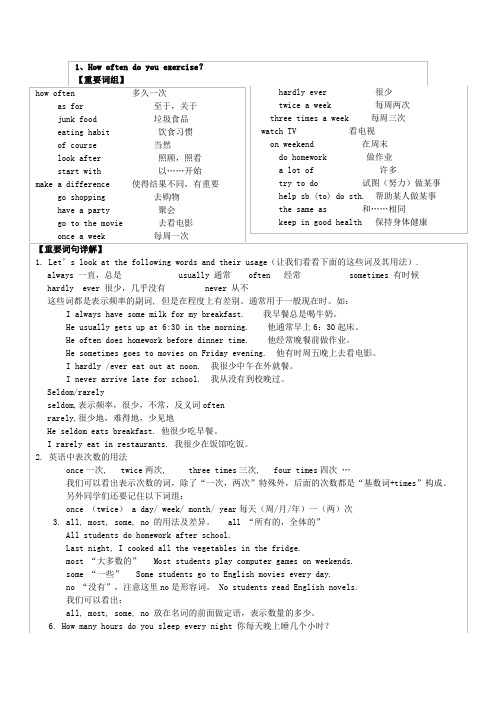
Detailed Solution for Unit 2 What’s the matter.【重要词组】◆ have a cold 患感冒◆ stressed out 紧张的,有压力的◆ bean sprout 豆芽◆ get tired 感觉疲惫◆ stay healthy 保持健康◆ at the moment 此刻,现在◆ get/ have a cold 患感冒◆ see a doctor /dentist 看医生/牙医◆ go to the party 去参加聚会◆ make sb sick 使某人不舒服(患锁病)◆ have a sore throat 嗓子痛◆ have a fever 发烧,发热◆ have a toothache 牙痛◆ have a backache 背痛◆lie down and rest 躺下休息◆drink lots of water 喝大量水◆drink hot tea with honey 喝热蜂蜜茶◆ have a headache 头痛◆ get tired 累了医院名称:children’s hospital 儿童医院clinic 诊疗所first - aid station 急救站ward 病房medical department 内科surgical department 外科registration office 挂号处out - patient department(OPD) 门诊部in - patient department 住院部nursing department 护理部waiting room 候诊室emergency room 急诊室operation room 手术室laboratory 化验室blood bank 血库pharmacy , dispensary 药房表示感觉的形容词有:tired 累的thirsty口渴的hungry饿的stressed out紧张的,有压力的【重要词句详解】1. How to talk about our health①问某人哪儿不舒服:When we are not feeling well , we often go to see the doctor . The doctor will ask :What’s wrong (with you)What’s the matter (with you) What’s your trouble What happens to youIs there anything wrong with you都表示“你怎么了”。
(完整版)人教版英语八年级上册全册教材全解:人教版英语八年级上册Unit1Wheredidyougoonvacation教材全解
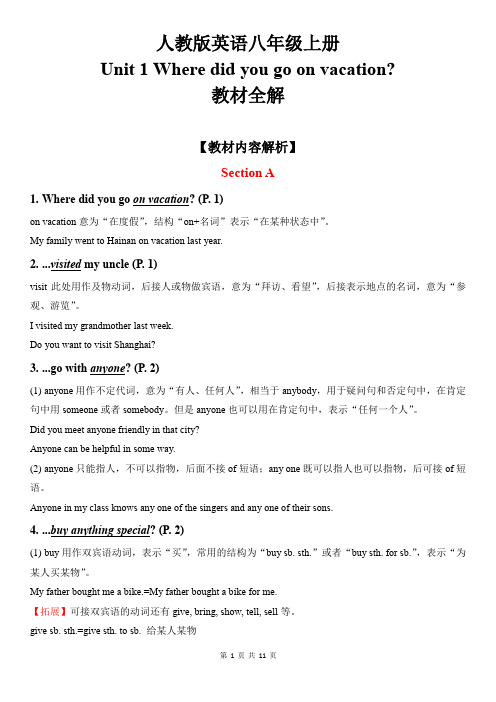
人教版英语八年级上册Unit 1 Where did you go on vacation?教材全解【教材内容解析】Section A1.Where did you go on vacation? (P. 1)on vacation意为“在度假”,结构“on+名词”表示“在某种状态中”。
My family went to Hainan on vacation last year.2....visited my uncle (P. 1)visit此处用作及物动词,后接人或物做宾语,意为“拜访、看望”,后接表示地点的名词,意为“参观、游览”。
I visited my grandmother last week.Do you want to visit Shanghai?3....go with anyone? (P. 2)(1)anyone用作不定代词,意为“有人、任何人”,相当于anybody,用于疑问句和否定句中,在肯定句中用someone或者somebody。
但是anyone也可以用在肯定句中,表示“任何一个人”。
Did you meet anyone friendly in that city?Anyone can be helpful in some way.(2)anyone只能指人,不可以指物,后面不接of短语;any one既可以指人也可以指物,后可接of短语。
Anyone in my class knows any one of the singers and any one of their sons.4....buy anything special? (P. 2)(1)buy用作双宾语动词,表示“买”,常用的结构为“buy sb. sth.”或者“buy sth. for sb.”,表示“为某人买某物”。
My father bought me a bike.=My father bought a bike for me.【拓展】可接双宾语的动词还有give, bring, show, tell, sell等。
人教版八年级上册英语单元教案(含教材分析)--Unit 1

Unit 1Where did you go on vacation?本单元教材以Where did you go on vacation?为中心话题,围绕着描述“过去发生的事情”展开,学习和运用一般过去时态的一般疑问句Did you go/see/buy...?和特殊疑问句Where/What/How...?询问过去的事件,让学生学会谈论和分享过去发生的事件。
本课教学内容与学生的实际生活密切相关,易于引发学生运用简单的英语进行交流。
在学习活动中,学生通过交换对过去发生的事情的描述及看法,促进学生之间和师生之间的情感交流,增进情谊。
Section A的主要学习内容是:复习一般过去时态和动词的规则与不规则变化,学习一般过去时态的一般疑问句:Did you...?及不定代词的用法。
Section B安排了许多听、说、读、写的任务活动,教师在教学中可以灵活运用这些活动,将其中的一些活动进行变化或整合,充分调动学生参与的积极性,提高学生的听说读写能力。
第一课时Section A(1a-2d)Teaching Goals【教学目标】Key words & phrases:anyone,anywhere,wonderful,few,most,quite a few,go on vacationKey sentences:1.Where did you go on vacation?I went to the mountains/New York City/summer camp/the beach.2.Did you...?Yes,I did./No,I didn't.Teaching Key Points【教学重点】The vocabulary:New York City,Central Park,few,most,quite a few,on vacationTarget language:Where did you/they/he/she go on vacation?I/They/He/She went to the mountains/New York City/summer camp/the beach. Did you...?Yes,I did./No,I didn't.Teaching Difficult Points【教学难点】Use the target language above to talk about past events.Teaching Aids【教学工具】An English textbook,a tape recorder,CAI or courseware.Teaching Steps【教学过程】★Step 1Leading inGreet the class and introduce what to learn in this period.Teacher:Welcome back to school!Did everyone have a good time during the summer vacation?Today we'll begin to learn the topic where you went on vacation.Teacher:Where did you go on vacation?Students:______.①I went to the mountains.②I visited museums.…★Step 2Pre-taskPage 1,1a & 1b.1.Look at the picture.2.Match each activity.3.Check the answers in 1b.4.Practice reading.Page 1,1c.1.Focus on the conversation in the box.2.Practice reading.3.Pairwork:Where did you go on vacation?I...4.Groupwork:Divide the class into groups of four or five. Make conversations.First S1 to S2:S1:Where did you go on vacation?S2:I...S1:Where did she/he go on vacation?S2:She/He...★Step 3While-taskPage 2,2a & 2b.1.Play the recording for the first time. Students complete the chart in 2a.2.Check the answers.(Point to one student who raises his or her hand.)3.Play the recording a second time and say:There are three conversations. The people talk about where they went on vacation. Listen to the recording and check(√)Yes,I did or No,I didn't for each question.4.Correct the answers.★Step 4Post-taskPage 2,2c & 2d.1.Focus on the conversation in 2c & 2d.2.Practice reading. Make students scan the conversations first.3.Teach and then make students role-play the conversation in pairs.4.Have a group of students present their conversation to the class.★Step 5Homework1.Practice the conversation on Page 2,2d.2.Do the exercises on Page 1 in students' book.Board Design板书设计Unit 1Where did you go on vacation?The first period Section A(1a-2d)1.Key vocabulary:anyone,anywhere,wonderful,quite a few,go on vacation 2.Target language:A:Where did Tina go on vacation?B:She went to the mountains.第二课时Section A(GF-3c)Teaching Goals【教学目标】Key words:something,nothing,everyone,myself,yourself,someone,seem,bored,diaryKey phrases:go out,have a good time,of course,keep a diaryKey sentences:1.Where did you go on vacation?I went to New York City.2.Did you go out with anyone?Did you buy anything special?3.How was the food?How was your vacation?Teaching Key Points【教学重点】The vocabulary:something,nothing,everyone,myself,yourself,someone,seem,bored,diary,go out,have a good time,of course,keep a diary,on vacation Target language:How was the food?Everything tasted really good!Did you go shopping?Of course!Did everyone have a good time?Oh,yes. Everything was excellent.Teaching Difficult Points【教学难点】e the target language above to talk about past events.2.The usage of someone,anyone,everyone,no one,something,anything,everything,nothing.Teaching Aids【教学工具】An English textbook,CAI or courseware.Teaching Steps【教学过程】★Step 1Leading in(T—teacher S—student)T:Where did you go last weekend?S:I went to the beach.T:Did you go there with anyone?S:Yes. I went to the beach with my brother.T:Did you have a good time there?S:...★Step 2Pre-taskPage 3,Grammar Focus.1.Review the grammar box. Work in pairs. One asks and the other answers.2.Practice reading the sentences in the chart.★Step 3While-taskPage 3,3a & 3b.1.Teach these new words:anyone,something,anything,everything,nothing,everyone,no one.2.Call students' attention to the conversation in 3a. Make students complete it individually.3.Choose a student to give his or her answers. Write the answers on the board.4.Correct the answers.5.Lead students to read this conversation.6.Have students work in pairs and role-play the conversation. As they talk,move around the classroom monitoring their work. Offer language or pronunciation support as needed.7.Make students complete the blanks in the e-mail message in 3b with the words in the box.8.Check the answers and then make students practice reading it.★Step 4Post-taskPage 3,3c.Complete the task in 3c.Ask your group questions about their last vacation. Then tell the class your results.★Step 5Homework1.Review the indefinite pronouns learned in this period.2.Do the exercises on Page 2 in students' book.Board Design板书设计Unit 1Where did you go on vacation?The second period Section A(GF-3c)1.The vocabulary:something,nothing,everyone,someone,myself,yourself,go out,of course2.Target language:①A:Where did you go on vacation?B:I went to New York City.②A:Did you buy anything special?B:Yes,I bought something for my father.3.Structure:something special4.Answers to 3a and 3b.第三课时Section B(1a-1e)Teaching Goals【教学目标】Key words:delicious,exciting,terrible,expensive,cheap,boringKey sentences:1.Where did Lisa go on vacation?2.Did she do anything special there?Did she buy anything for her best friend?Did Lisa like her vacation?3.How was/were...?Teaching Key Points【教学重点】The vocabulary:delicious,exciting,terrible,expensive,cheap,boringTarget language:Where did Lisa go on vacation?Did she do anything special there?Did she buy anything for her best friend?How was/were...?Teaching Difficult Points【教学难点】1.询问去过何地以及感受(评价)Where did you go?I went to the beaches. How was it?It was exciting.2.Use the target language to talk about your past events.Teaching Aids【教学工具】An English textbook,a tape recorder,CAI or courseware.Teaching Steps【教学过程】★Step 1Leading in1.Greetings.2.T:Where did you go on vacation?S:I went to summer camp.T:Did you do anything special there?S:Yes,I...T:Did you buy anything for your parents or friends?S:Yes,I bought...for.../No,I bought nothing.T:How was/were...?S:It was/They were...★Step 2Pre-taskPage 4,1a & 1b.1.Look at the six pictures.2.Match the words with the pictures.3.Students complete the task in 1b individually.4.Check the answers.★Step 3While-taskPage 4,1c & 1d.1.Make students scan the questions in 1c.2.Play the recording for the first time. And say:Listen to the tape. Lisa is talking about her vacation. Complete the four questions.3.Play the recording a second time. Students complete the task in 1d.4.Correct the answers.★Step 4Post-taskPage 4,1e.Ask 3 or 4 students to answer questions about Lisa's vacation. You can begin your questions with:Where did...?What did...?Did she...?How was...?How were...?★Step 5Homework1.Review these sentences:Where did...?Did...?How was/were...?2.Do the exercises on Page 3 in students' book.Board Design板书设计Unit 1Where did you go on vacation?The third period Section B(1a-1e)1.Words:delicious,exciting,terrible,expensive,cheap,boring2.Sentences:①Where did Lisa go on vacation?②Did she buy anything special?③Did she buy anything for her best friend?④Did Lisa like her vacation?3.Answers to Activity 1a:1—5f a c e b dAnswers to Activity 1b:wordsdeliciousexcitingcheapwordsterribleexpensiveboring第四课时Section B(2a-2e)Teaching Goals【教学目标】Key words:activity,decide,try,bird,bicycle,building,trader,wonder,difference,top,wait,umbrella,wet,below,enough,hungry,asKey phrases:feel like,because of,go to the beach,a lot of,a little,take the train,too many,what aboutKey sentences:1.I wonder what life was like here in the past.2.What a difference a day makes!3.We waited over an hour for the train because there were too many people.Teaching Key Points【教学重点】Learn Jane's diary entries about her vacation.1.The vocabulary:activity,decide,try,wonder,difference,wait,below,enough,hungry,as,feel like,because of2.Target language:I wonder what life was like here in the past. We waited over an hour for the train because there were too many people.Teaching Difficult Points【教学难点】1.because and because of2.What a difference a day makes!3.Learn to write a diary.Teaching Aids【教学工具】An English textbook,CAI or courseware.Teaching Steps【教学过程】★Step 1Leading in1.Greetings.2.Introduce what to learn in this period,especially the articles in 2b,Jane's diary entries. Teacher begins like this:Today we'll focus on two diary entries about Jane's vacation. Through the learning you'll know how to write a diary. Let's begin now.★Step 2Pre-taskPage 5,2a & 2b.1.Review and discuss the questions in 2a box with your partner.2.Project these new words on the screen or write them on the board and teach the new words. Ask students to repeat them. And make sure everyone knows the meanings.activity n.活动;decide v.决定;try v. & n.尝试,设法;wonder v.想知道;difference n.差异;top n.顶部;wait v. & n.等待;umbrella n.伞;below prep.& adv.在……下面;enough adj.充足的;hungry adj.饥饿的3.Make students scan the articles first. Ask students to put a mark in contents that are unfamiliar to them. Then the teacher lead students to learn these two articles sentence by sentence. Pay attention to these points:(1)decide v.决定;decide to do sth.决定做某事;(2)try v.尝试;try doing sth.尝试做某事;try to do sth.尽力做某事;(3)below prep. & adv.在……下面;(4)feel like 给……的感觉;(5)because and because of;(6)wonder v.想知道4.Practice reading.★Step 3While-taskPage 6,2c & 2d.1.Make students read Jane's diary entries again. Fill in the chart in 2c.2.Students complete the conversation in 2d using the information in Jane's dairy entries.3.Choose 3 or 4 students to give their answers.4.Correct the answers.5.Have students work in pairs. Student A will be Anna and student B will be Jane. Act the conversation out.★Step 4Post-taskPage 6,2e.1.Make students complete the blanks in 2e.2.Ask one student to write his or her answers on the board.3.Check the answers together with the class.4.Practice reading.★Step 5Homework1.Write a diary.2.Do the exercises on Page 4 in students' book.Board Design板书设计Unit 1Where did you go on vacation?The fourth period Section B(2a—2e)1.Key vocabulary:decide,try,wonder,difference,top,wait,below,enough,hungry,as,feel like,because of,too many2.Sentences:①I wonder what life was like here in the past.②And because of the bad weather,we couldn't see anything below.第五课时Section B(3a-Self Check)Teaching Goals【教学目标】Key words & phrases:duck,dislike,take photos,Tian'anmen Square,the Palace Museum,bring back,shopping center,have a fun time,school trip,come upKey sentences:1.How did you feel about the trip?2.It was so beautiful that we forgot about the last five hours!Teaching Key Points【教学重点】The vocabulary:dislike,take photos,Tian'anmen Square,the Palace MuseumTarget language:What did you like best?Did you dislike anything?How did you feel about the trip?Teaching Difficult Points【教学难点】Write a travel diary.Teaching Aids【教学工具】An English textbook,CAI or courseware.Teaching Steps【教学过程】★Step 1Leading in1.Greetings.2.T:Beijing is the capital of our country. It's famous for its long history and places of interest,such as Tian'anmen Square,the Palace Museum,the Summer Palace and so on. And Beijing duck is very delicious. Have you ever been to Beijing?Tell your travel to us.★Step 2Pre-taskPage 7,3a.1.Look at the three pictures.2.Use the words and phrases in the box to complete the blanks in the article.3.Check the answers.★Step 3While-taskPage 8,Self Check.Complete the tasks in Self Check.1.Have students complete the task of Part 1.Then Choose 2 or 3 students to give their answers. Check the answers.2.Induct students to complete the passage of Part 2.Check the answers.3.Practice reading.★Step 4Post-taskPage 7,3b & 3c.1.Make students answer the questions in 3b and take notes.2.Teach students how to write a travel diary.3.Students write a travel diary like Jane's on Page 5 using the notes in 3b.4.Choose 2 or 3 students' diaries. Make students read them out. Point out the weakness and induct the students to correct their diaries.★Step 5Homework1.Write a travel diary.2.Do the exercises on Page 5 in students' book.Board Design板书设计Unit 1Where did you go on vacation?The fifth period Section B(3a-Self Check)1.Key vocabulary:dislike,Tian'anmen Square,the Palace Museum,have a fun time,come up2.Sentences:①Did you dislike anything?②How did you feel about the trip?③My legs were so tired that I wanted to stop.。
新人教版新目标初中英语八年级上册教材全解读

新人教版新目标初中英语八年级上册教材全解读新人教版新目标初中英语八年级上册教材全解读教材分析首先,我简要的谈一下教材的结构和内容:上册共10个单元,每个单元又分为三部分:Section A, Section B, Self-check。
并且各有侧重点。
其中Section A 包括单元的重点词汇,用语法聚焦框来呈现语法例句,总结本单元的语法点,任务型的听力练习,用结伴对话来进行互动活动,学生在互相合作中使用目标语言来完成本部分的学习。
Section B在循环section A 所呈现的语言的同时引出新的词汇;以活动帮助学生整合新的目标语言和前面学过的语言。
主要包含词汇拓展,新旧语言知识综合运用,阅读,同步写作练习等。
Self-check 复习所有重点词汇以及新学的语法项目;以图片方式进一步应用了本课的目标语言。
这部分主要包括词汇知识的评价,语言应用知识。
本册语法知识比较多,主要包括对一般现在时的巩固复习,形容词和副词的比较级和最高级,现在进行时表示将来,一般将来时,一般过去时,以及情态动词的用法。
学生对这些语法现象和语法知识有了一个系统的了解和掌握,基本做到了学以致用。
新教材的一个最大的特色是采用了“以学生为中心”的教学理念,每个单元的教材设计都采用任务型语言教学模式,融会话题,交际功能和语言结构,形成了一套循序渐进的生活化的学习程序。
其次,新教材在生活化的基础上,进一步强化自主学习。
倡导活动性语言输入,在活动中训练英语听,说,读,写四大技能。
并强调课堂上师生互动。
新教材强调教师要改变过去课堂上老师主讲,学生被动学习的方式。
教师课堂上主要是组织引导学生通过听、说、读、写、唱、游、演、画、做等形式让学生讲英语、用英语、用英语思考,用英语交流,用英语来获取信息和传递信息。
学生学习中碰到问题,老师应引导学生自己讨论、分析、辨别、而不是老师直接给答案,以达到真正把学生能力培养出来的目的。
再次,新教材能够很好的培养学生的正确的、与时俱进的情感态度价值观,所选的教材话题都能很好的体现新时代青少年的精神风貌。
八年级英语上册第一单元课文解析(人教版新目标)

八年级英语上册第一单元文解析(人教版新目标)SetinA图片原文你去哪里度假了?我去爬山了。
a待在家里去纽约市了看望了我叔叔去参加夏令营了去爬山了去海滩了参观了博物馆蒂娜去哪里度假了?她去爬山了。
2格雷斯,你去哪里度假了?我去纽约市了。
噢,真的吗?你和别人一起去的吗?是的,我和妈妈一起去的。
2d嗨,海伦。
好久不见了。
嗨,里克。
是的,我上个月去度假了。
哦,你去有趣的地方了吗?是的,我和家人一起去贵州了。
哇!你看到黄果树瀑布了吗?是的,我看到了。
它太美了!我们在那里拍了不少照片。
你呢?上个月你做什么特别的事了吗?真的没有。
我大部分时间只是待在家里读书休息。
GraarFus你去哪里度假了?我去纽约市了。
你和别人一起出去了吗?不,没有人在这儿。
大家都在度假。
你买特别的东西了吗?是的,我为我爸爸买了些东西。
不,我没买任何东西。
食物怎么样?所有的东西尝起来真的很好吃!大家都玩得很开心吗?哦,是的。
一切都很好。
3a爱丽斯,你度假的时候做过有趣的事吗?是的,我做过。
我去了三亚。
你觉得它怎么样?嗯,我是第一次去那儿,因此那里的一切真的很有趣。
你和别人一起去的吗?是的,我是。
我和我姐姐一起去的。
你们去购物了吗?当然了!我为我父亲买了一些东西,但我没有为我自己买任何东西。
你为什么没有为自己买东西?我是真的没有看到我喜欢的东西。
3b亲爱的比尔,你的假期过得怎么样?你做过有趣的事情吗?你的家人都和你在一起吗?我和家人一起去了乡下一个朋友的农场。
农场里的一切都很棒。
我们喂母鸡吃食,还看到了一些小猪,它们是如此可爱!唯一的问题是晚上除了读书没什么事可做。
(即使这样)仍然没有人看起来无聊。
到这儿该说再见了!马克SetinBa美味的昂贵的令人兴奋的便宜的可怕的无聊的莉萨去哪里度假了?她在那里做过一些特别的事吗?是什么事?她为她最好的朋友买东西了吗?莉萨喜欢她的假期吗?2a人们通常在假期里做什么?你发现什么活动让人快乐?2b简在星期一玩得高兴吗?星期二呢?7月1日,星期一今天早上我和家人到达了马来西亚的槟城。
最新--中学教材全解-八年级英语(上)(人教版)教材听力原文

最新--中学教材全解-⼋年级英语(上)(⼈教版)教材听⼒原⽂14-15 中学教材全解⼋年级英语(上)(⼈教版)教材听⼒原⽂14-15初中英语《全解》增值服务UNIT 1 Section A1b Listen and number the people in the picture [1-5].Conversation 1Xiang Hua: Hey,Tina. Where did you go on vacation? Tina: I went to the mountains with my f amily.Xiang Hua: Did everyone have a good time ?Tina: Oh, yes. Everything was excellent. Where did you go, Xiang Hua?Xiang Hua: I went to New York City.Conversation 2Girl: What did you do on vacation, Sally ?Sally: Nothing. I just stayed at home. Girl: And did you do anything interesting , Bob?Bob: Yes. I visited my uncle. We went f ishing, but we didn’t get any fish. Conversation 3Boy: Did you go anywhere on vacation, To m? Tom: I went to summer camp. Boy: D id you go with anyone?Tom: Yes. I went with my friends. Everyo ne had a great time.2a Listen. Where did the people go on v acation? Complete the chart. Conversation 1Boy: Where did you go on vacation, Grace ? Grace: I went to New York City. Boy: Oh, really? Did you go with anyone? Grace: Yes. I went with my mother. B oy: Did you go to Central Park? Grace: Yes, I did. It was really nice. Boy: Did you buy anything special?Grace: Yes. I bought something for my fa ther. Boy: Oh, really? What? Grace: I bought him a hat.Conversation 2Girl: Where did you go on vacation, Kevi n? Kevin: I went to the beach.Girl: Oh, that’s nice. Did you play volleyball? Kevin: No, I didn’t.Girl: Well, did you swim?Kevin: Yes, I did. The water was really warm.1b 听录⾳,并把图中⼈物按[1~5]排序。
人教版英语八年级上册Unit1 单元教材分析

Unit1 单元教材分析本单元的核心话题是讨论过去发生的事情或者动作。
具体要学习由where、how引.导的特殊疑问句,以及一般过去时的一般疑问句及其肯定、否定的回答。
一般过去时在人教版新教材七年级下册的Unit 11和Unit 12中已经学过,因此在本单元的学习中感到有话可说。
但是动词一般过去时的变化中,一些不规则动词的变化需要进一步复习、总结和补充。
此外,本单元还涉及到评价过去所发生的事情,且形容词的运用在本单元有所突出,因此教师不仅要教学新单词,还要指导学生复习以前学过的部分形容词。
不定代词也是本单元的一个学习重点,在本单元,要将几个不定代词加以区分比较,归纳总结。
Section A:主要学习一般过去时中由where引导的特殊疑问句以及回答。
谈论的话题是“过去发生的事情”,其中la提供了众多地点名词,此外教师还可以根据课堂需要补充一些有关地点的短语。
对于不定代词的学习可以通过比较法,如:something,anything, everything 与nothing。
首先从词性上区分,然后从单词的含义上区分,最后再从单词的短语或特殊用法上区分。
教学la时,可指导学生通过图文相结合的方式使学生熟练掌握有关地点的短语。
1b的主要内容是某人在假期的某个去向。
在播放录音的同时,指导学生结合la,完成任务。
1c是对本单元一个目标语言的操练。
是对听力结果的一个综合展示。
A:Where did Tina go on vacation?B:She went to the mountains.可以先让学生按照1b中人名的先后顺序一一练习,然后让学生自由发挥练习,如:A:Where did you go (last week/last month/...)?B:I went to....2a和2b是对表示地点的重点短语的检测。
播放录音之前要告诉学生“There are three students. They went to different places on vacation. Please write down the places.”此外,在此部分中出现了不定代词,anything和anyone。
人教版英语八年级上册全册教材全解:人教版英语八年级上册 Unit 1 Where did you go on vacation教材全解
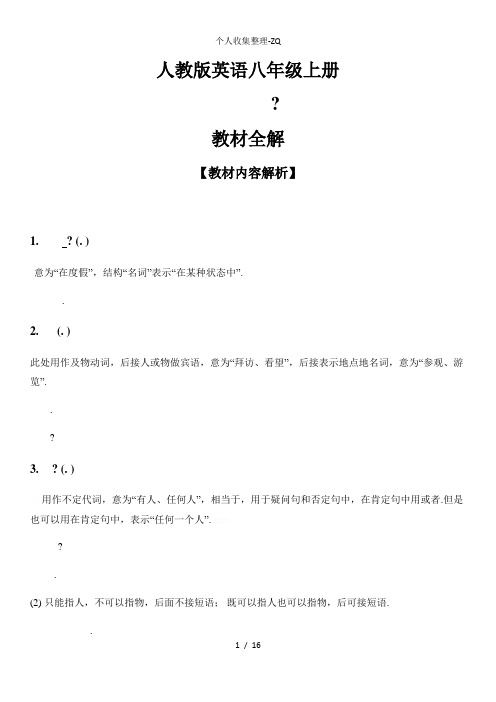
人教版英语八年级上册?教材全解【教材内容解析】1.? (. )意为“在度假”,结构“名词”表示“在某种状态中”..2.(. )此处用作及物动词,后接人或物做宾语,意为“拜访、看望”,后接表示地点地名词,意为“参观、游览”..?3.? (. )用作不定代词,意为“有人、任何人”,相当于,用于疑问句和否定句中,在肯定句中用或者.但是也可以用在肯定句中,表示“任何一个人”.?.(2)只能指人,不可以指物,后面不接短语;既可以指人也可以指物,后可接短语..(1)用作双宾语动词,表示“买”,常用地结构为“ . .”或者“ . .”,表示“为某人买某物”..【拓展】可接双宾语地动词还有, , , , 等.. . . 给某人某物. . . 把某物带给某人. . . 给某人看某物. . . 告诉某人某物. . . 把某物卖给某人(2)形容词修饰复合不定代词(, , , )时,放在复合不定代词后面..5. . (. )意为“拍照、照相”, .意为“给……拍照”..?6. . (. )表示“……中大多数”,后接可数名词或者不可数名词,作主语时,谓语动词单复数取决于后面所接名词地单复数...用作不定代词,表示“没有任何东西”,相当于 .’ .8.? (. )表示“玩得开心”,后接动词,表示“做某事很开心”,相当于 .....9.? (. )...?意为“你认为……怎么样”,相当于 ...?或者 ...??.10.? (. )表示“去购物、去买东西”,相当于 .类似地短语还有: , , , , , 等..11.! (. )意为“当然”,相当于或者.?!12. . (. )() 用作系动词,表示“似乎、好像”,常用地结构有:句子....(2)表示“感到厌倦地”,用来说明人地感受;表示“令人厌烦地、单调地”,用来说明事物地特征..【拓展】以结尾地形容词,通常用来修饰或者描述人,以结尾地动词,通常用来修饰或者描述物,类似地形容词还有:; ; .1.? (. )() 这里表示“发现、觉得”,宾语后常接宾语补足语,常用地结构有:介词短语...., .(2)是地形容词形式,表示“有趣地、令人愉快地”.’ ..2. . (. )作不及物动词,表示“到达”,接宾语时,需要加上介词或者.例如:?’.【拓展】表示“到达”时,是及物动词,后面直接接表示地点地名词作宾语.另外两个表示“到达”地动词(和)都是不及物动词,地点;地点.3. . (. )表示“决定”时,常用地结构为: .“决定做某事”..4.. (. ). “尝试做某事”; . “尽力做某事”...【拓展】也可以用作名词,表示“尝试”,表示“尝试一下”.’ .5. . (. )此处表示“感觉像”,后接从句..【拓展】还可以表示“想要”,后接名词、代词或者动名词做宾语, .???6. ...(. )相当于表示“许多”,可以用来修饰可数名词复数或者不可数名词..【拓展】只修饰不可数名词地量词有: , , , ,只修饰可数名词地量词有: , , , , ,既可以修饰不可数名词也可以修饰可数名词地量词有:, , , ,7. . (. )表示“好奇、想知道”,后接, , , 等引导宾语从句.... . (. )用作及物动词,表示“喜欢”,后接名词、代词或者动名词做宾语.?’ .9.! (. )本句是引导地感叹句,引导地感叹句常用地结构有:“形容词单数可数名词主语谓语”或者“形容词可数名词复数不可数名词主语谓语”.!!!【拓展】引导地感叹句地结构为“形容词副词主语谓语”.!!. , . (. )()表示“想要”时,为及物动词,后接不定式作宾语或者用于句型“ . .”中,表示“想要某人做某事”.’ ..() 后常接名词、动词不定式或者动名词作宾语,用法相当于.?’ .11. . (. )() .“等待某人或者某事”; .“等待做某事”;’.“迫不及待做某事”..’ .(2)此处表示“多于、超过”,相当于 ..() , 和辨析12., ’ . (. )() 意为“因为、由于”,后接名词、代词或者动名词,是连词,引导原因状语从句,后接一个句子...(2)表示“在……以下、低于”,反义词是,意为“在……之上,超过”..13.’ ...(. )()表示“带来”,强调从别地地方带到说话地地方,常与副词连用;表示“带走”,强调从说话地地方带去别地地方,常与副词连用;表示“搬、抬”,没有方向性..()可以用作形容词,表示“足够地、充分地”,用来修饰名词,可以放在名词前面,也可以放在名词后面...【拓展】还可以用作副词,修饰形容词或者副词,放在形容词或者副词后面,常用地结构为:.“足够……能够做某事”...14., . (. )当我们要表示双方某方面(如年龄、身高等)程度相同或不同时,常用…或…结构,表示“和……一样”或“和……不一样”.如:.玛丽和琳达一样仔细..他跑步没有汤姆快.15. . (. ).“忘记做某事”,强调忘记去做某事,实际上也没有做;.“忘记做过某事”,强调已经做过某事,但是忘记了..’ .’?16.? (. )意为“为什么”,表示提出建议,后接动词原形,相当于’ ...??’?17. . (. )此处表示“具有、带有”,还可以表示“和……在一起”或者“用”...18. . (. )...意为“如此……以至于……”,用来引导结果状语从句,是副词,后面接形容词或者副词...【拓展】...引导结果状语从句,表示“如此……以至于……”,后面接名词短语,名词前经常跟有形容词进行修饰...19., . (. )(1). .“告诉某人做某事”, . .“告诉某人不要做某事”...(2) .表示“继续做某事、一直做某事”.() 表示“继续”, .表示“(完成一件事后)接着做另一件事”, .意为“继续做同一件事”..’ ..20. . (. )表示“上上下下、来来回回”...21., . (. )意为“升起、发生”...【重点短语和句型归纳】一、重点短语1. 去度假2. 待在家里去爬山去海滩参观博物馆去参加夏令营相当多为测验而学习出去大部分时间玩得高兴当然给……地感觉;感受到去购物在过去四处走走因为. … 一碗……. 第二天喝茶找出;查明继续照相重要地事上上下下出来出版发行跟别人出去发表对…看法雨下得大太多二、重点句型. . . .为某人买某物. 尝起来看起来听起来闻起来不错…动词原形除了……之外什么都没有() . 看起来……大地点小地点地点地点到达某地 .决定去做某事.尝试做某事 .尽力去做某事.忘记做过某事 .忘记做某事.喜欢做某事. .想去做某事.开始做某事. 停止做某事. 不喜欢做某事.继续做某事不停做某事. ’ 为什么不做……呢?从句如此……以至于……. () . 告诉某人(不要)做某事名词,形容词真地没有似乎好像做某事!到这该说再见了.… … …你认为……怎么样【语法讲解】一复合不定代词1、由, , , 加上, , 构成不定代词,成为复合不定代词.2、用法(1)复合不定代词相当于名词,在句中可以用作主语、宾语和表语..’ .’ .(2)复合不定代词被形容词、动词不定式修饰时,形容词和动词不定式后置...(3)复合不定代词做主语时,表示单数概念,谓语动词用单词形式..(4)不定代词用在肯定句中或者表示请求地一般疑问句中;不定代词多用于疑问句中否定句中.??(5)和也可以用在肯定句中,表示“任何人”和“任何事”...二一般过去时地规则动词和不规则动词(一)规则变化构成规则:在动词末尾直接加 . 例如,, , –以不发音地字母结尾地动词,直接加 . 例如,– , – , –以辅音字母结尾地,变为再加 . 例如,– , – , –以重读闭音节结尾且末尾只有一个辅音字母地,双写最后地辅音字母,再加 . 例如,– , –(二)不规则变化. 没有变化,即:与动词原形一样.例如,– , – , –. 变化元音,例如,, – , –. 变化辅音,例如,– , – , –. 辅音和元音都变化,例如,– , – , –. 其他情况,例如,– , – , –。
人教版八年级英语上册第一单元知识详解

人教版八年级英语上册第一单元知识详解人教版八年级英语上册第一单元知识详解 Unit 1 How often do you exercise?考点扫描:一)习惯用语:watch TV 看电视go to the movies 去看电影on weekends 在周末hardly ever 几乎不how often 多久一次once a week 一周一次twice a month 一月两次do homework 做家庭作业the result of……的结果as for 至于,对于junk food 垃圾食品be good/bad for 对…有益/害eating habits 饮食习惯try to do sth.尽力做某事lots of=a lot of许多of course/Sure当然come home from school从学校来到家look after=take care of 照看;照顾a healthy lifestyle 一种健康的生活方式be the same as…和…相同be different from…和…不同want to do sth.想要做某事want sb. to do sth.想要某人做某事make a big difference 有很大不同keep healthy = stay healthykeep in good health =keep fit 保持健康surf the Internet上网get good grades 取得好成绩二)重点句型:1.What does she do on weekends? 她在周末常干什么?2.She often goes to the movies. 她经常去看电影。
3.I watch TV every day. 我每天都看电视。
4.We often surf the Internet. 我们经常上网。
5.I read English books about twice a week. 我大约一周两次看英语书。
人教版八年级上册英语Unit-1-5-全部词汇详解课件(137页)全文

taste it.
prep. & adv. 在……下面; 到……下面
反义词: above,意为“超过;在……上面”。 例句: ◆ From the top of the building, I could
短语:twice a week 一周两次 think twice 再三考虑
例句: ◆ I go to the movies twice a week. ◆ The ruler is twice as long as that one.
拓展: “一次”用once,“两次”用twice, “三次及以上”用“基数词+times” 如:twice a day, four times a year
dislikes.
Unit 2 How often do you exercise?
Section A
n.家务劳动; 家务事
构成: house(n. 房子)+ work( n. 工作) 短语:do (the) housework 做家务 例句:
◆ He is too lazy so he hardly does housework.
拓展:enjoyable 的相关词 enjoy: v. 享受;喜爱 enjoyment: activities 例句: The park is a popular place
for relaxing activities.
v. 决定;选定
句型: decide (not) to do sth. 决定(不)做某事 decide+“疑问词+动词不定式” decide+宾语从句 decide on sth. 就某事做决定;选定某事 例句:
人教版八年级上册英语单元教案(含教材分析)--Unit 1

Unit 1Where did you go on vacation?本单元教材以Where did you go on vacation?为中心话题,围绕着描述“过去发生的事情”展开,学习和运用一般过去时态的一般疑问句Did you go/see/buy...?和特殊疑问句Where/What/How...?询问过去的事件,让学生学会谈论和分享过去发生的事件。
本课教学内容与学生的实际生活密切相关,易于引发学生运用简单的英语进行交流。
在学习活动中,学生通过交换对过去发生的事情的描述及看法,促进学生之间和师生之间的情感交流,增进情谊。
Section A的主要学习内容是:复习一般过去时态和动词的规则与不规则变化,学习一般过去时态的一般疑问句:Did you...?及不定代词的用法。
Section B安排了许多听、说、读、写的任务活动,教师在教学中可以灵活运用这些活动,将其中的一些活动进行变化或整合,充分调动学生参与的积极性,提高学生的听说读写能力。
第一课时Section A(1a-2d)Teaching Goals【教学目标】Key words & phrases:anyone,anywhere,wonderful,few,most,quite a few,go on vacationKey sentences:1.Where did you go on vacation?I went to the mountains/New York City/summer camp/the beach.2.Did you...?Yes,I did./No,I didn't.Teaching Key Points【教学重点】The vocabulary:New York City,Central Park,few,most,quite a few,on vacationTarget language:Where did you/they/he/she go on vacation?I/They/He/She went to the mountains/New York City/summer camp/the beach. Did you...?Yes,I did./No,I didn't.Teaching Difficult Points【教学难点】Use the target language above to talk about past events.Teaching Aids【教学工具】An English textbook,a tape recorder,CAI or courseware.Teaching Steps【教学过程】★Step 1Leading inGreet the class and introduce what to learn in this period.Teacher:Welcome back to school!Did everyone have a good time during the summer vacation?Today we'll begin to learn the topic where you went on vacation.Teacher:Where did you go on vacation?Students:______.①I went to the mountains.②I visited museums.…★Step 2Pre-taskPage 1,1a & 1b.1.Look at the picture.2.Match each activity.3.Check the answers in 1b.4.Practice reading.Page 1,1c.1.Focus on the conversation in the box.2.Practice reading.3.Pairwork:Where did you go on vacation?I...4.Groupwork:Divide the class into groups of four or five. Make conversations.First S1 to S2:S1:Where did you go on vacation?S2:I...S1:Where did she/he go on vacation?S2:She/He...★Step 3While-taskPage 2,2a & 2b.1.Play the recording for the first time. Students complete the chart in 2a.2.Check the answers.(Point to one student who raises his or her hand.)3.Play the recording a second time and say:There are three conversations. The people talk about where they went on vacation. Listen to the recording and check(√)Yes,I did or No,I didn't for each question.4.Correct the answers.★Step 4Post-taskPage 2,2c & 2d.1.Focus on the conversation in 2c & 2d.2.Practice reading. Make students scan the conversations first.3.Teach and then make students role-play the conversation in pairs.4.Have a group of students present their conversation to the class.★Step 5Homework1.Practice the conversation on Page 2,2d.2.Do the exercises on Page 1 in students' book.Board Design板书设计Unit 1Where did you go on vacation?The first period Section A(1a-2d)1.Key vocabulary:anyone,anywhere,wonderful,quite a few,go on vacation 2.Target language:A:Where did Tina go on vacation?B:She went to the mountains.第二课时Section A(GF-3c)Teaching Goals【教学目标】Key words:something,nothing,everyone,myself,yourself,someone,seem,bored,diaryKey phrases:go out,have a good time,of course,keep a diaryKey sentences:1.Where did you go on vacation?I went to New York City.2.Did you go out with anyone?Did you buy anything special?3.How was the food?How was your vacation?Teaching Key Points【教学重点】The vocabulary:something,nothing,everyone,myself,yourself,someone,seem,bored,diary,go out,have a good time,of course,keep a diary,on vacation Target language:How was the food?Everything tasted really good!Did you go shopping?Of course!Did everyone have a good time?Oh,yes. Everything was excellent.Teaching Difficult Points【教学难点】e the target language above to talk about past events.2.The usage of someone,anyone,everyone,no one,something,anything,everything,nothing.Teaching Aids【教学工具】An English textbook,CAI or courseware.Teaching Steps【教学过程】★Step 1Leading in(T—teacher S—student)T:Where did you go last weekend?S:I went to the beach.T:Did you go there with anyone?S:Yes. I went to the beach with my brother.T:Did you have a good time there?S:...★Step 2Pre-taskPage 3,Grammar Focus.1.Review the grammar box. Work in pairs. One asks and the other answers.2.Practice reading the sentences in the chart.★Step 3While-taskPage 3,3a & 3b.1.Teach these new words:anyone,something,anything,everything,nothing,everyone,no one.2.Call students' attention to the conversation in 3a. Make students complete it individually.3.Choose a student to give his or her answers. Write the answers on the board.4.Correct the answers.5.Lead students to read this conversation.6.Have students work in pairs and role-play the conversation. As they talk,move around the classroom monitoring their work. Offer language or pronunciation support as needed.7.Make students complete the blanks in the e-mail message in 3b with the words in the box.8.Check the answers and then make students practice reading it.★Step 4Post-taskPage 3,3c.Complete the task in 3c.Ask your group questions about their last vacation. Then tell the class your results.★Step 5Homework1.Review the indefinite pronouns learned in this period.2.Do the exercises on Page 2 in students' book.Board Design板书设计Unit 1Where did you go on vacation?The second period Section A(GF-3c)1.The vocabulary:something,nothing,everyone,someone,myself,yourself,go out,of course2.Target language:①A:Where did you go on vacation?B:I went to New York City.②A:Did you buy anything special?B:Yes,I bought something for my father.3.Structure:something special4.Answers to 3a and 3b.第三课时Section B(1a-1e)Teaching Goals【教学目标】Key words:delicious,exciting,terrible,expensive,cheap,boringKey sentences:1.Where did Lisa go on vacation?2.Did she do anything special there?Did she buy anything for her best friend?Did Lisa like her vacation?3.How was/were...?Teaching Key Points【教学重点】The vocabulary:delicious,exciting,terrible,expensive,cheap,boringTarget language:Where did Lisa go on vacation?Did she do anything special there?Did she buy anything for her best friend?How was/were...?Teaching Difficult Points【教学难点】1.询问去过何地以及感受(评价)Where did you go?I went to the beaches. How was it?It was exciting.2.Use the target language to talk about your past events.Teaching Aids【教学工具】An English textbook,a tape recorder,CAI or courseware.Teaching Steps【教学过程】★Step 1Leading in1.Greetings.2.T:Where did you go on vacation?S:I went to summer camp.T:Did you do anything special there?S:Yes,I...T:Did you buy anything for your parents or friends?S:Yes,I bought...for.../No,I bought nothing.T:How was/were...?S:It was/They were...★Step 2Pre-taskPage 4,1a & 1b.1.Look at the six pictures.2.Match the words with the pictures.3.Students complete the task in 1b individually.4.Check the answers.★Step 3While-taskPage 4,1c & 1d.1.Make students scan the questions in 1c.2.Play the recording for the first time. And say:Listen to the tape. Lisa is talking about her vacation. Complete the four questions.3.Play the recording a second time. Students complete the task in 1d.4.Correct the answers.★Step 4Post-taskPage 4,1e.Ask 3 or 4 students to answer questions about Lisa's vacation. You can begin your questions with:Where did...?What did...?Did she...?How was...?How were...?★Step 5Homework1.Review these sentences:Where did...?Did...?How was/were...?2.Do the exercises on Page 3 in students' book.Board Design板书设计Unit 1Where did you go on vacation?The third period Section B(1a-1e)1.Words:delicious,exciting,terrible,expensive,cheap,boring2.Sentences:①Where did Lisa go on vacation?②Did she buy anything special?③Did she buy anything for her best friend?④Did Lisa like her vacation?3.Answers to Activity 1a:1—5f a c e b dAnswers to Activity 1b:wordsdeliciousexcitingcheapwordsterribleexpensiveboring第四课时Section B(2a-2e)Teaching Goals【教学目标】Key words:activity,decide,try,bird,bicycle,building,trader,wonder,difference,top,wait,umbrella,wet,below,enough,hungry,asKey phrases:feel like,because of,go to the beach,a lot of,a little,take the train,too many,what aboutKey sentences:1.I wonder what life was like here in the past.2.What a difference a day makes!3.We waited over an hour for the train because there were too many people.Teaching Key Points【教学重点】Learn Jane's diary entries about her vacation.1.The vocabulary:activity,decide,try,wonder,difference,wait,below,enough,hungry,as,feel like,because of2.Target language:I wonder what life was like here in the past. We waited over an hour for the train because there were too many people.Teaching Difficult Points【教学难点】1.because and because of2.What a difference a day makes!3.Learn to write a diary.Teaching Aids【教学工具】An English textbook,CAI or courseware.Teaching Steps【教学过程】★Step 1Leading in1.Greetings.2.Introduce what to learn in this period,especially the articles in 2b,Jane's diary entries. Teacher begins like this:Today we'll focus on two diary entries about Jane's vacation. Through the learning you'll know how to write a diary. Let's begin now.★Step 2Pre-taskPage 5,2a & 2b.1.Review and discuss the questions in 2a box with your partner.2.Project these new words on the screen or write them on the board and teach the new words. Ask students to repeat them. And make sure everyone knows the meanings.activity n.活动;decide v.决定;try v. & n.尝试,设法;wonder v.想知道;difference n.差异;top n.顶部;wait v. & n.等待;umbrella n.伞;below prep.& adv.在……下面;enough adj.充足的;hungry adj.饥饿的3.Make students scan the articles first. Ask students to put a mark in contents that are unfamiliar to them. Then the teacher lead students to learn these two articles sentence by sentence. Pay attention to these points:(1)decide v.决定;decide to do sth.决定做某事;(2)try v.尝试;try doing sth.尝试做某事;try to do sth.尽力做某事;(3)below prep. & adv.在……下面;(4)feel like 给……的感觉;(5)because and because of;(6)wonder v.想知道4.Practice reading.★Step 3While-taskPage 6,2c & 2d.1.Make students read Jane's diary entries again. Fill in the chart in 2c.2.Students complete the conversation in 2d using the information in Jane's dairy entries.3.Choose 3 or 4 students to give their answers.4.Correct the answers.5.Have students work in pairs. Student A will be Anna and student B will be Jane. Act the conversation out.★Step 4Post-taskPage 6,2e.1.Make students complete the blanks in 2e.2.Ask one student to write his or her answers on the board.3.Check the answers together with the class.4.Practice reading.★Step 5Homework1.Write a diary.2.Do the exercises on Page 4 in students' book.Board Design板书设计Unit 1Where did you go on vacation?The fourth period Section B(2a—2e)1.Key vocabulary:decide,try,wonder,difference,top,wait,below,enough,hungry,as,feel like,because of,too many2.Sentences:①I wonder what life was like here in the past.②And because of the bad weather,we couldn't see anything below.第五课时Section B(3a-Self Check)Teaching Goals【教学目标】Key words & phrases:duck,dislike,take photos,Tian'anmen Square,the Palace Museum,bring back,shopping center,have a fun time,school trip,come upKey sentences:1.How did you feel about the trip?2.It was so beautiful that we forgot about the last five hours!Teaching Key Points【教学重点】The vocabulary:dislike,take photos,Tian'anmen Square,the Palace MuseumTarget language:What did you like best?Did you dislike anything?How did you feel about the trip?Teaching Difficult Points【教学难点】Write a travel diary.Teaching Aids【教学工具】An English textbook,CAI or courseware.Teaching Steps【教学过程】★Step 1Leading in1.Greetings.2.T:Beijing is the capital of our country. It's famous for its long history and places of interest,such as Tian'anmen Square,the Palace Museum,the Summer Palace and so on. And Beijing duck is very delicious. Have you ever been to Beijing?Tell your travel to us.★Step 2Pre-taskPage 7,3a.1.Look at the three pictures.2.Use the words and phrases in the box to complete the blanks in the article.3.Check the answers.★Step 3While-taskPage 8,Self Check.Complete the tasks in Self Check.1.Have students complete the task of Part 1.Then Choose 2 or 3 students to give their answers. Check the answers.2.Induct students to complete the passage of Part 2.Check the answers.3.Practice reading.★Step 4Post-taskPage 7,3b & 3c.1.Make students answer the questions in 3b and take notes.2.Teach students how to write a travel diary.3.Students write a travel diary like Jane's on Page 5 using the notes in 3b.4.Choose 2 or 3 students' diaries. Make students read them out. Point out the weakness and induct the students to correct their diaries.★Step 5Homework1.Write a travel diary.2.Do the exercises on Page 5 in students' book.Board Design板书设计Unit 1Where did you go on vacation?The fifth period Section B(3a-Self Check)1.Key vocabulary:dislike,Tian'anmen Square,the Palace Museum,have a fun time,come up2.Sentences:①Did you dislike anything?②How did you feel about the trip?③My legs were so tired that I wanted to stop.。
人教版英语八年级上册全册教材全解
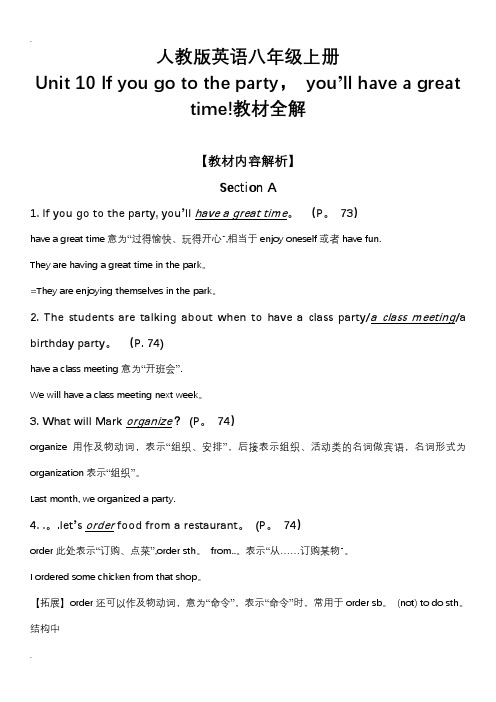
人教版英语八年级上册Unit 10 If you go to the party,you’ll have a greattime!教材全解【教材内容解析】Section A1.If you go to the party, you’ll have a great time。
(P。
73)have a great time意为“过得愉快、玩得开心",相当于enjoy oneself或者have fun.They are having a great time in the park。
=They are enjoying themselves in the park。
2. The students are talking about when to have a class party/a class meeting/a birthday party。
(P. 74)have a class meeting意为“开班会”.We will have a class meeting next week。
3. What will Mark organize?(P。
74)organize用作及物动词,表示“组织、安排”,后接表示组织、活动类的名词做宾语,名词形式为organization表示“组织”。
Last month, we organized a party.4..。
.let’s order food from a restaurant。
(P。
74)order此处表示“订购、点菜”,order sth。
from..。
表示“从……订购某物"。
I ordered some chicken from that shop。
【拓展】order还可以作及物动词,意为“命令”,表示“命令”时,常用于order sb。
(not) to do sth。
结构中The police ordered him to wait right here。
(完整版)人教版英语八年级上册全册教材全解:人教版英语八年级上册Unit1Wheredidyougoonvacation教材全解

人教版英语八年级上册Unit 1 Where did you go on vacation?教材全解【教材内容解析】Section A1.Where did you go on vacation? (P. 1)on vacation意为“在度假”,结构“on+名词”表示“在某种状态中”。
My family went to Hainan on vacation last year.2....visited my uncle (P. 1)visit此处用作及物动词,后接人或物做宾语,意为“拜访、看望”,后接表示地点的名词,意为“参观、游览”。
I visited my grandmother last week.Do you want to visit Shanghai?3....go with anyone? (P. 2)(1)anyone用作不定代词,意为“有人、任何人”,相当于anybody,用于疑问句和否定句中,在肯定句中用someone或者somebody。
但是anyone也可以用在肯定句中,表示“任何一个人”。
Did you meet anyone friendly in that city?Anyone can be helpful in some way.(2)anyone只能指人,不可以指物,后面不接of短语;any one既可以指人也可以指物,后可接of短语。
Anyone in my class knows any one of the singers and any one of their sons.4....buy anything special? (P. 2)(1)buy用作双宾语动词,表示“买”,常用的结构为“buy sb. sth.”或者“buy sth. for sb.”,表示“为某人买某物”。
My father bought me a bike.=My father bought a bike for me.【拓展】可接双宾语的动词还有give, bring, show, tell, sell等。
八年级英语上册Unit1《Whe...

八年级英语上册Unit1《Whe...第一篇:八年级英语上册 Unit 1《Where did you go on vacation》精解与精练 (新版)人教新目标版Unit 1 Where did you go on vacation? 短语:go on vacation stay at home go to the mountains go to the beach visit museums go to summer camp quite a few study for go out most of the time taste good have a good time of course feel like go shopping in the past walk around too many because of one bowl of find out go on take photos something important up and down come up 语法:Where did you go on vacation? I went to New York City.Did you go out with anyone? No, No one was here.Everyone was on vacation.Did you buy anything special? Yes, I bought something for my father.How was the food? Everything tasted really good.Did everyone have a good time? Oh,yes.Everything was excellent.惯用法:1.buy sth for ab./ buy sb.sth 为某人买某物2.taste + adj.尝起来……3.nothing ….but + V.(原形)除了……之外什么都没有4.seem +(to be)+ adj 看起来5.arrive in + 大地方 / arrive at + 小地方到达某地6.decide to do sth.决定做某事7.try doing sth.尝试做某事 / try to do sth.尽力做某事 8.enjoy doing sth.喜欢做某事 9.want to do sth.想去做某事 10.start doing sth.开始做某事 11.stop doing sth.停止做某事 12.look + adj 看起来13.dislike doing sth.不喜欢做某事 14.Why not do sth.为什么不做…….呢?15.so + adj + that + 从句如此……以至于……16.tell sb.(not)to do sth.告诉某人(不要)做某事17.keepdoing sth.继续做某事18.forget to do sth.忘记去做某事 / forget doing sth 忘记做过某事词语辨析:anywhere 与 somewhere 两者都是不定副词。
人教版八年级上册英语全册教案解析
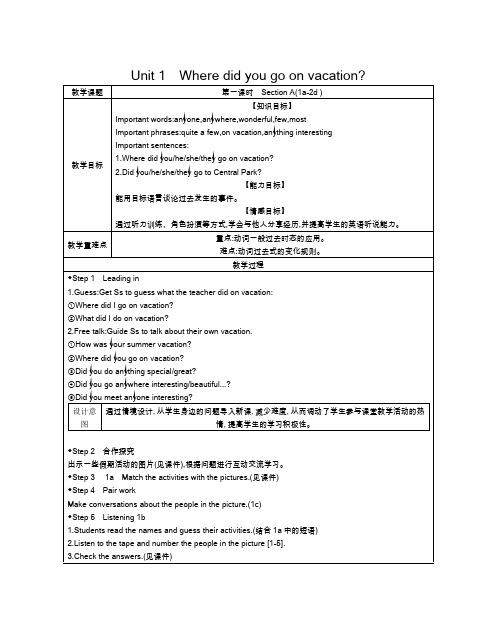
学重难点教学过程◆Step 1 Leading inT:Good morning,class.Today we will learn Section B(1a-2e).First,let’s review what we learnedyesterday.Now let’s have a free talk.教学过程T:Where did you go on vacation?S:I went to summer camp.T:Did you do anything special there?S:Yes,I...T:Did you buy anything for your parents or friends?S:Yes,I bought...for.../No,I bought nothing.T:How was/were...?S:It was/They were...设计意图让学生做到温故知新。
◆Step 2 1a1.Look at the six pictures.2.Match the words with the pictures.3.Students complete the task in 1b individually.4.Check the answers.(见课件)◆Step 3 1bNow class,look at the words in 1a again.Which words do you think describe good things and which ones not.Let’s have a try.Try to write words on the left.Write words on the right.Check the answers.(见课件)◆Step 4 1c & 1d1.Ask students to scan the questions in 1c.2.Play the recording for the first time.And say:Listen to the tape.Lisa is talking about her plete the four questions.3.Check the answers.(见课件)4.Play the recording a second time.Students complete the task in 1d.5.Correct the answers.(见课件)◆Step 5 1eAsk 3 or 4 students to answer questions about Lisa’s vacation.You can begin your questions with:Where did...?What did...?Did she...?How was...?How were...?。
- 1、下载文档前请自行甄别文档内容的完整性,平台不提供额外的编辑、内容补充、找答案等附加服务。
- 2、"仅部分预览"的文档,不可在线预览部分如存在完整性等问题,可反馈申请退款(可完整预览的文档不适用该条件!)。
- 3、如文档侵犯您的权益,请联系客服反馈,我们会尽快为您处理(人工客服工作时间:9:00-18:30)。
人教版英语八年级上册Unit 1 Where did you go on vacation?教材全解【教材内容解析】Section A1.Where did you go on vacation? (P. 1)on vacation意为“在度假”,结构“on+名词”表示“在某种状态中”。
My family went to Hainan on vacation last year.2....visited my uncle (P. 1)visit此处用作及物动词,后接人或物做宾语,意为“拜访、看望”,后接表示地点的名词,意为“参观、游览”。
I visited my grandmother last week.Do you want to visit Shanghai?3....go with anyone? (P. 2)(1)anyone用作不定代词,意为“有人、任何人”,相当于anybody,用于疑问句和否定句中,在肯定句中用someone或者somebody。
但是anyone也可以用在肯定句中,表示“任何一个人”。
Did you meet anyone friendly in that city?Anyone can be helpful in some way.(2)anyone只能指人,不可以指物,后面不接of短语;any one既可以指人也可以指物,后可接of短语。
Anyone in my class knows any one of the singers and any one of their sons.4....buy anything special? (P. 2)(1)buy用作双宾语动词,表示“买”,常用的结构为“buy sb. sth.”或者“buy sth. for sb.”,表示“为某人买某物”。
My father bought me a bike.=My father bought a bike for me.【拓展】可接双宾语的动词还有give, bring, show, tell, sell等。
give sb. sth.=give sth. to sb. 给某人某物bring sb. sth.=bring sth. to sb. 把某物带给某人show sb. sth.=show sth. to sb. 给某人看某物tell sb. sth.=tell sth. to sb. 告诉某人某物sell sb. sth.=sell sth. to sb. 把某物卖给某人(2)形容词修饰复合不定代词(something/body/one, anything/body/one, nothing/body/one, everything/body/one)时,放在复合不定代词后面。
I have something important to tell you.5.We took quite a few photos there. (P. 2)take photos意为“拍照、照相”,take a photo/photos of sb./sth.意为“给……拍照”。
We took many photos on the Great Wall.Could you take a photo of us?6.I just stayed at home most of the time to read and relax. (P. 2)most of表示“……中大多数”,后接可数名词或者不可数名词,作主语时,谓语动词单复数取决于后面所接名词的单复数。
Most of the food goes bad.Most of us are going to the park.7.No, I bought nothing. (P. 3)nothing用作不定代词,表示“没有任何东西”,相当于not anything。
I did nothing special last month.=I didn’t do anything special last month.8.Did everyone have a good time? (P. 3)have a good time表示“玩得开心”,后接动词ing,表示“做某事很开心”,have a good time相当于enjoy oneself/have fun。
We had a good time at the party.=We enjoyed ourselves at the party.=We had fun at the party.I had a good time playing with my friends on the playground.9.How did you like it? (P. 3)How do you like...?意为“你认为……怎么样”,相当于How do you feel about...?或者What do you think of...?-How do you like the film?-Wonderful.10.Did you go shopping? (P. 3)go shopping表示“去购物、去买东西”,相当于do some shopping。
类似的短语还有:go swimming, go skating, go fishing, go hiking, go boating, go camping等。
I went shopping and bought something for my parents.11.Of course! (P. 3)of course意为“当然”,相当于sure或者certainly。
-May I borrow your dictionary?-Of course!12.Still no one seemed to be bored. (P. 3)(1) seem用作系动词,表示“似乎、好像”,常用的结构有:seem+adj./to be/that+句子。
The story seems true.What he said seemed to be a lie.It seems that they are going to pull down the house.(2)bored表示“感到厌倦的”,用来说明人的感受;boring表示“令人厌烦的、单调的”,用来说明事物的特征。
The film was so boring that almost anyone felt bored.【拓展】以ed结尾的形容词,通常用来修饰或者描述人,以ing结尾的动词,通常用来修饰或者描述物,类似的形容词还有:interesting/interested; exciting/excited; surprising/surprised。
Section B1.What activities do you find enjoyable? (P. 5)(1) find这里表示“发现、觉得”,宾语后常接宾语补足语,常用的结构有:find sb./sth+n./adj./doing sth./介词短语。
The students find her a kind teacher.I find the book useful.When I passed his house,I found his wife cooking.Finally, they found the boy in the tree.(2)enjoyable是enjoy的形容词形式,表示“有趣的、令人愉快的”。
I’m sure that we will have an enjoyable vacation.The job is enjoyable and I like it.2.I arrived in Penang in Malaysia this morning with my family. (P. 5)arrive作不及物动词,表示“到达”,接宾语时,需要加上介词in或者at。
例如:When did you arrive?We are arriving at the station at two o’clock.【拓展】reach表示“到达”时,是及物动词,后面直接接表示地点的名词作宾语。
另外两个表示“到达”的动词(get和arrive)都是不及物动词,get to+地点;arrive in/at+地点。
3....so we decided to go to the beach near our hotel. (P. 5)decide表示“决定”时,常用的结构为:decide to do sth.“决定做某事”。
The government decided to build another school in this village.4.My sister and I tried paragliding. (P. 5)try doing sth. “尝试做某事”;try to do sth. “尽力做某事”。
The doctor tries to save the sick girl.The boy tried playing the piano.【拓展】try也可以用作名词,表示“尝试”,have a try表示“尝试一下”。
I’m going to have a try.5.I felt like I was a bird. (P. 5)feel like此处表示“感觉像”,后接从句。
He feels like he is swimming.【拓展】feel like还可以表示“想要”,后接名词、代词或者动名词做宾语,feel like doing sth.=would like to do sth.=want to do sth.Do you feel like going out for a walk with me?=Would you like to go out for a walk with me?=Do you want to go out for a walk with me?6.There are a lot of new buildings now...(P. 5)a lot of相当于lots of表示“许多”,可以用来修饰可数名词复数或者不可数名词。
There is a lot of rain in summer in this place.【拓展】只修饰不可数名词的量词有:a little, little, a great deal of, much, too much只修饰可数名词的量词有:a few, few, several, many, too many, a number of既可以修饰不可数名词也可以修饰可数名词的量词有:some, any, a lot of, lots of, plenty of7.I wonder what life was like here in th past. (P. 5)wonder表示“好奇、想知道”,后接whether/if, what, who, why等引导宾语从句。
